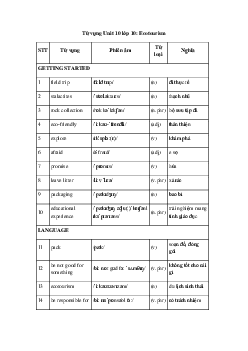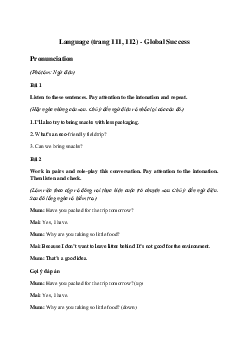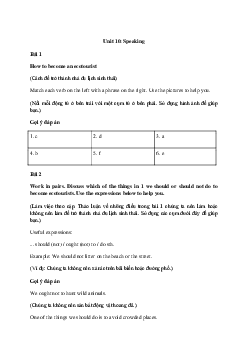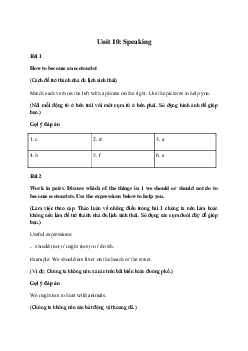

Preview text:
Unit 10: Looking Back Vocabulary
Choose the correct word to complete the conversation.
(Chọn từ đúng để hoàn thành đoạn hội thoại.)
Mai: Ms Hoa, what is (1) mass / sustainable tourism?
Ms Hoa: Well, the aim of this kind of tourism is to (2) protect / damage the
environment, respect local culture, and keep (3) benefits / profits local.
Mai: Can you give me an example?
Ms Hoa: When travelling, we should not (4) litter / impact on the street. We should
also be (5) aware / responsible of the local traditions and respect them.
Mai: So is this kind of tourism similar to (6) ecotourism / mass tourism ?
Ms Hoa: Well, it's a form of sustainable tourism because it has a positive (7) impact / craft on the environment. Gợi ý đáp án 1. sustainable 2. protect 3. profits 4. litter 5. aware 6. ecotourism 7. impact Pronunciation
Work in pairs. Role-play the conversation above. Try to use appropriate intonation.
(Làm việc theo cặp. Nhập vai vào đoạn hội thoại trên. Cố gắng sử dụng thành phần thích hợp.) Grammar
Put the verbs in brackets in the correct forms.
(Chia dạng đúng các động từ trong ngoặc.)
1. If I (be) ______ you, I (live) ______ with a host family so that I can learn more about the local culture.
2. If we (work) ______ together, we (be) ______ able to reduce the negative impact of tourism on the environment.
3. If we (allow) ______ more people to crowd the city centre, we (have) ______ to
deal with environmental pollution in the future.
4. If we (have) ______ enough money, we (go) ______ on an ecotour to Finland.
Instead, were staying in Viet Nam in the summer. Gợi ý đáp án
1. were/was; would live 2. work; will be 3. allow; will have 4. had; would go



